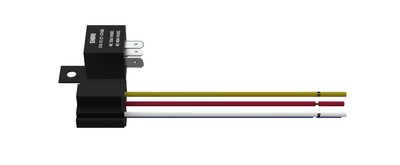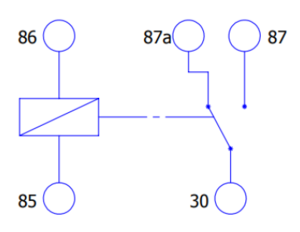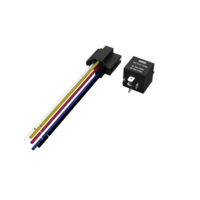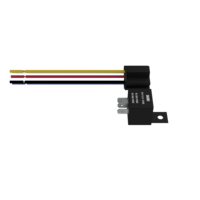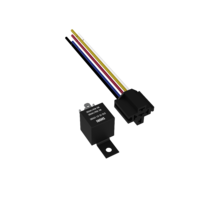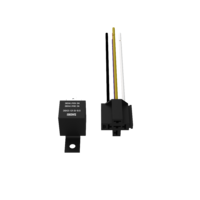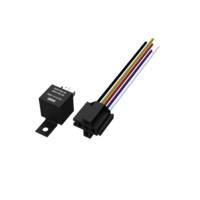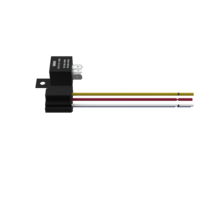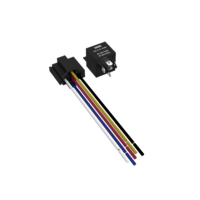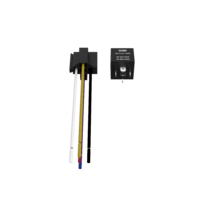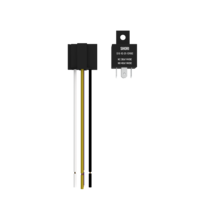Difference between revisions of "Automotive Relay"
From Wiki Knowledge Base | Teltonika GPS
| (27 intermediate revisions by 2 users not shown) | |||
| Line 1: | Line 1: | ||
| − | |||
__TOC__ | __TOC__ | ||
=Introduction to the product= | =Introduction to the product= | ||
| − | + | Automotive relays are the common type of electromechanical relay that are used in all types of vehicles, like car, trucks, vans and trailers. They enable a small current flow circuit to control and operate a higher current circuit in vehicular applications and can be used with various solutions and provide useful use cases:<br> | |
| − | |||
| − | |||
| + | * [[FMB120_Features_settings#Immobilizer|Immobilizer scenario]] | ||
* [[Anti-Theft_Solution_and_Stolen_Vehicle_Recovery|Anti-Theft Solution and Stolen Vehicle Recovery]] | * [[Anti-Theft_Solution_and_Stolen_Vehicle_Recovery|Anti-Theft Solution and Stolen Vehicle Recovery]] | ||
| − | * [[https:// | + | * [[Secure_vehicle_disabling|Secure vehicle disabling]] |
| − | + | * [https://teltonika-gps.com/industries/use-cases/automated-drivers-time-tracking-and-identification/ Automated Drivers Time Tracking And Identification] | |
| − | + | [[File:Automotive Relay3.png|400px]] | |
| − | |||
| − | |||
=Product Specification= | =Product Specification= | ||
[[Image:Relay scheme.png|thumb|Relay schematic diagram|300px|right]] | [[Image:Relay scheme.png|thumb|Relay schematic diagram|300px|right]] | ||
| Line 56: | Line 52: | ||
| style="border: 1px solid white; border-bottom: 2px solid #E8E8E8; text-align: left; vertical-align: center; background: white;" |Weight | | style="border: 1px solid white; border-bottom: 2px solid #E8E8E8; text-align: left; vertical-align: center; background: white;" |Weight | ||
| style="border: 1px solid white; border-bottom: 2px solid #E8E8E8; text-align: left; vertical-align: center; background: white;" |40g | | style="border: 1px solid white; border-bottom: 2px solid #E8E8E8; text-align: left; vertical-align: center; background: white;" |40g | ||
| + | |- | ||
| + | | style="border: 1px solid white; border-bottom: 2px solid #E8E8E8; text-align: left; vertical-align: center; background: white;" |Supported by | ||
| + | | style="border: 1px solid white; border-bottom: 2px solid #E8E8E8; text-align: left; vertical-align: center; background: white;" |<span class="mw-collapsible mw-collapsed"> [https://wiki.teltonika-gps.com/view/FMB110 FMB110], [https://wiki.teltonika-gps.com/view/FMB120 FMB120], [https://wiki.teltonika-gps.com/view/FMB122 FMB122], [https://wiki.teltonika-gps.com/view/FMB125 FMB125], [https://wiki.teltonika-gps.com/view/FMU125 FMU125], [https://wiki.teltonika-gps.com/view/FMM125 FMM125], [https://wiki.teltonika-gps.com/view/FMC125 FMC125], [https://wiki.teltonika-gps.com/view/FMU126 FMU126], [https://wiki.teltonika-gps.com/view/FMB130 FMB130], [https://wiki.teltonika-gps.com/view/FMU130 FMU130], [https://wiki.teltonika-gps.com/view/FMC130 FMC130], [https://wiki.teltonika-gps.com/view/FMM130 FMM130], [https://wiki.teltonika-gps.com/view/FMB140 FMB140], [https://wiki.teltonika-gps.com/view/FMB202 FMB202], [https://wiki.teltonika-gps.com/view/FMB204 FMB204], [https://wiki.teltonika-gps.com/view/FMB208 FMB208], [https://wiki.teltonika-gps.com/view/FMB640 FMB640], [https://wiki.teltonika-gps.com/view/FMC640 FMC640], [https://wiki.teltonika-gps.com/view/FMM640 FMM640], [https://wiki.teltonika-gps.com/view/FMB900 FMB900], [https://wiki.teltonika-gps.com/view/FMB910 FMB910], [https://wiki.teltonika-gps.com/view/FMB920 FMB920]</span> | ||
|- | |- | ||
|} | |} | ||
| − | + | =Installation= | |
| − | |||
{| class="wikitable" | {| class="wikitable" | ||
| Line 86: | Line 84: | ||
| style="border: 1px solid white; border-bottom: 2px solid #E8E8E8; text-align: left; vertical-align: center; background: white;" |87a | | style="border: 1px solid white; border-bottom: 2px solid #E8E8E8; text-align: left; vertical-align: center; background: white;" |87a | ||
| style="border: 1px solid white; border-bottom: 2px solid #E8E8E8; text-align: left; vertical-align: center; background: white;" |<span style="color:red"><b>Red</b></span> | | style="border: 1px solid white; border-bottom: 2px solid #E8E8E8; text-align: left; vertical-align: center; background: white;" |<span style="color:red"><b>Red</b></span> | ||
| − | | style="border: 1px solid white; border-bottom: 2px solid #E8E8E8; text-align: left; vertical-align: center; background: white;" |Normally Closed (NC) - | + | | style="border: 1px solid white; border-bottom: 2px solid #E8E8E8; text-align: left; vertical-align: center; background: white;" |Normally Closed (NC) |
| + | |- | ||
| + | |} | ||
| + | |||
| + | =Promotional Material= | ||
| + | <font size="-1"> | ||
| + | {| class="wikitable" style="border:2px solid white; background: white" | ||
| + | |+ | ||
| + | | style="border:1px solid white; width: 220px" | [[File:Relay and wiring 1.png|200px|center]] | ||
| + | | style="border:1px solid white; width: 220px" | [[File:Relay and wiring 2.png|200px|center]] | ||
| + | | style="border:1px solid white; width: 220px" | [[File:Relay and wiring 3.png|200px|center]] | ||
| + | | style="border:1px solid white; width: 220px" | [[File:Relay and wiring 4.png|200px|center]] | ||
| + | | style="border:1px solid white; width: 220px" | [[File:Relay and wiring 5.png|200px|center]] | ||
| + | |- | ||
| + | |} | ||
| + | </font> | ||
| + | <font size="-1"> | ||
| + | {| class="wikitable" style="border:2px solid white; background: white" | ||
| + | |+ | ||
| + | | style="border:1px solid white; width: 220px" | [[File:Relay and wiring 6.png|200px|center]] | ||
| + | | style="border:1px solid white; width: 220px" | [[File:Relay and wiring 7.png|200px|center]] | ||
| + | | style="border:1px solid white; width: 220px" | [[File:Relay and wiring 8.png|200px|center]] | ||
| + | | style="border:1px solid white; width: 220px" | [[File:Relay and wiring 9.png|200px|center]] | ||
|- | |- | ||
|} | |} | ||
| + | </font> | ||
[[Category:Accessories]] | [[Category:Accessories]] | ||
Latest revision as of 15:41, 2 December 2021
Main Page > Accessories > Automotive RelayIntroduction to the product
Automotive relays are the common type of electromechanical relay that are used in all types of vehicles, like car, trucks, vans and trailers. They enable a small current flow circuit to control and operate a higher current circuit in vehicular applications and can be used with various solutions and provide useful use cases:
- Immobilizer scenario
- Anti-Theft Solution and Stolen Vehicle Recovery
- Secure vehicle disabling
- Automated Drivers Time Tracking And Identification
Product Specification
| Name | Value |
|---|---|
| Contact Rating | 30A/40A 14VDC |
| Coil Voltage | 12VDC |
| Coil Power | 1.8W |
| Release Voltage | ≥10% |
| Pickup Voltage | ≤70% |
| Insulation Resistance | 100Ω |
| Contact Resistance | 100Ω |
| Between open contact | 500VAC |
| Between coil & contact | 750VAC |
| Temperature Range | -55~+85℃ |
| Dimension | 25.0x27.4x28.4 |
| Weight | 40g |
| Supported by | FMB110, FMB120, FMB122, FMB125, FMU125, FMM125, FMC125, FMU126, FMB130, FMU130, FMC130, FMM130, FMB140, FMB202, FMB204, FMB208, FMB640, FMC640, FMM640, FMB900, FMB910, FMB920 |
Installation
| Relay PIN | Relay cable color | Connection |
|---|---|---|
| 30 | Blue | Common connection to NO & NC terminals |
| 85 | Black | Coil |
| 86 | White | Coil |
| 87 | Yellow | Normally Open (NO) |
| 87a | Red | Normally Closed (NC) |
Promotional Material
